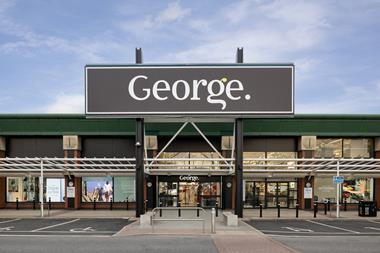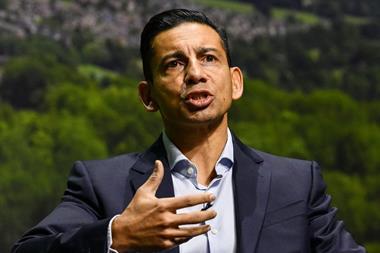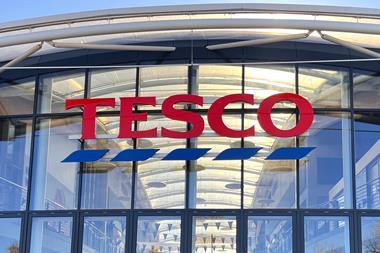Winner of The Grocer Cup for Outstanding Business Achievement, Tony DeNunzio might accept that Tesco is unbeatable. But he relishes strengthening his grip on the number two spot, and sees plenty of avenues for further growth at Asda. He talks to Julian Hunt
The bar at the Royal Lancaster Hotel in London - with its luxurious furnishings, a pianist tinkling the ivories, outrageous drinks prices and customers in black tie - feels like a slightly incongruous setting for an interview with the boss of one of Britain’s leading exponents of every day low cost and every day low prices.
We are there because Asda boss Tony DeNunzio is attending the IGD Food Industry Awards and he has just learnt that he is the winner of The Grocer Cup for Outstanding Business Achievement - as voted for by readers of this magazine.
The award comes at significant time in the story of Asda. It’s five years since the business was acquired by Wal-Mart and in that time it has undergone some dramatic changes. DeNunzio rattles off a list of
milestones that have been achieved by Asda since June 1999: making £1bn of price cuts, becoming the number two supermarket chain, hitting the number one spot for clothing in volume terms, the recognition in countless independent surveys of being a great place to work, developing new formats, using Wal-Mart’s nous to extend general merchandise, and using the same knowledge exchange to bring in new IT systems that have helped to transform Asda.
Much of that change has been driven through in the three years since DeNunzio - an Asda man for 11 years - took charge of the business. But Wal-Mart’s most successful subsidiary has not had it all its own way. The Tesco juggernaut has continued to roar on and would appear to have an unassailable lead over its arch-rival. If he is frustrated by that fact, DeNunzio hides its well.
“With the current planning and competition regulations, it is difficult to catch Tesco,” he admits. “But we do not have a specific objective to be the number one in food in the UK. Our aim is to be the best business we can and grow profitably. The most important thing is that we are a company that continues to grow.”
Asda did seem to wobble in the summer. But DeNunzio shrugs that off: “The summer was slower partly because of the weather but also because we have lots of store change projects under way such as mezzanine floors and extensions. We are not worried about going forwards.”
Our TradeTrak figures this week show that while Sainsbury’s decline seems to be bottoming out, Asda is within a hair’s breadth of overtaking it to become the number two food retailer, taking 16% of food-only spend in the 12 weeks to October 2. This compares with 16.5% for Sainsbury.
Looking to where the market will be five years from now, DeNunzio says: “There’s going to be a clear number one. There will be three companies vying for the number two spot and we would want to be the clear number two. We have lots of opportunities to grow - our trials of new formats will open lots of new avenues.”
These new formats have been capturing headlines. First, there was the standalone George, and two weeks ago Asda opened the first of its Living general merchandise stores. DeNunzio is excited about the prospects for both trials, as he is about the work developing a 15,000 sq ft Asda concept.
“We have developed flexible formats from 15,000 sq ft to 100,000 sq ft. There are very few planning consents being given so even with that flexibility it’s difficult to open new stores. But we have two Somerfield acquisitions of 15,000 sq ft stores that we are opening. We have the George high street stores and now Living. We have developed lots of routes for growth in a difficult planning environment.”
That’s important, as is Asda’s strong value position. DeNunzio believes the focus on value will continue to be the key theme in the coming years, and he says those caught in the middle of this polarising market will struggle - whether they are in general merchandise or food. “Anybody whose pricing and cost structure is too high will continue to suffer,” says DeNunzio. “It will be very difficult for those in the middle without a clear, well-defined strategy - whether it is to generate value at higher price or a focus on value.”
Life since Wal-Mart
>> The challenges ahead
It is more than five years since the £6.7bn takeover that sparked predictions of ferocious price wars, an influx of American products and the arrival of the aircraft hangar-style store.
Yet rather than being transformed into an all-American proposition, Asda has very much been left to its own devices, even teaching its parent company a few tricks or two as far as clothing is concerned.
Its only problem is that it hasn’t been growing as fast as Tesco, say the experts:
Richard Ratner, Seymour Pierce
“Asda has done very well. I’m not sure that that Wal-Mart has put a huge amount into Asda - Asda has developed under the Wal-Mart umbrella. In terms of clothing, it has taught Wal-Mart a few lessons.”
Jonathan Pitkänen, Fitch Ratings
“Wal-Mart has improved management and helped it become the market leader in non-food. What Asda doesn’t have and Tesco does is a landbank. This is a critical stage for Asda. It’s being left behind in terms of format. But I don’t quite get the rumours about buying Matalan. It’s northern-based but it is very volatile and there would be some cannibalisation.”
Edward Garner, TNS Superpanel
“They’ve slowed up after a hell of a run. My sense is that it is not going to change the relationship between Bentonville and Leeds but they are losing as much as they’re gaining. And Tesco is unstoppable. I think one of the things Asda will focus on is doing what it is doing well now, better.”
Life since Wal-Mart
>>the challenges aheadIt is now more than five years since the £6.7bn takeover that sparked predictions of ferocious price wars, an influx of American products and the arrival of the aircraft hangar-style store.
The bar at the Royal Lancaster Hotel in London - with its luxurious furnishings, a pianist tinkling the ivories, outrageous drinks prices and customers in black tie - feels like a slightly incongruous setting for an interview with the boss of one of Britain’s leading exponents of every day low cost and every day low prices.
We are there because Asda boss Tony DeNunzio is attending the IGD Food Industry Awards and he has just learnt that he is the winner of The Grocer Cup for Outstanding Business Achievement - as voted for by readers of this magazine.
The award comes at significant time in the story of Asda. It’s five years since the business was acquired by Wal-Mart and in that time it has undergone some dramatic changes. DeNunzio rattles off a list of
milestones that have been achieved by Asda since June 1999: making £1bn of price cuts, becoming the number two supermarket chain, hitting the number one spot for clothing in volume terms, the recognition in countless independent surveys of being a great place to work, developing new formats, using Wal-Mart’s nous to extend general merchandise, and using the same knowledge exchange to bring in new IT systems that have helped to transform Asda.
Much of that change has been driven through in the three years since DeNunzio - an Asda man for 11 years - took charge of the business. But Wal-Mart’s most successful subsidiary has not had it all its own way. The Tesco juggernaut has continued to roar on and would appear to have an unassailable lead over its arch-rival. If he is frustrated by that fact, DeNunzio hides its well.
“With the current planning and competition regulations, it is difficult to catch Tesco,” he admits. “But we do not have a specific objective to be the number one in food in the UK. Our aim is to be the best business we can and grow profitably. The most important thing is that we are a company that continues to grow.”
Asda did seem to wobble in the summer. But DeNunzio shrugs that off: “The summer was slower partly because of the weather but also because we have lots of store change projects under way such as mezzanine floors and extensions. We are not worried about going forwards.”
Our TradeTrak figures this week show that while Sainsbury’s decline seems to be bottoming out, Asda is within a hair’s breadth of overtaking it to become the number two food retailer, taking 16% of food-only spend in the 12 weeks to October 2. This compares with 16.5% for Sainsbury.
Looking to where the market will be five years from now, DeNunzio says: “There’s going to be a clear number one. There will be three companies vying for the number two spot and we would want to be the clear number two. We have lots of opportunities to grow - our trials of new formats will open lots of new avenues.”
These new formats have been capturing headlines. First, there was the standalone George, and two weeks ago Asda opened the first of its Living general merchandise stores. DeNunzio is excited about the prospects for both trials, as he is about the work developing a 15,000 sq ft Asda concept.
“We have developed flexible formats from 15,000 sq ft to 100,000 sq ft. There are very few planning consents being given so even with that flexibility it’s difficult to open new stores. But we have two Somerfield acquisitions of 15,000 sq ft stores that we are opening. We have the George high street stores and now Living. We have developed lots of routes for growth in a difficult planning environment.”
That’s important, as is Asda’s strong value position. DeNunzio believes the focus on value will continue to be the key theme in the coming years, and he says those caught in the middle of this polarising market will struggle - whether they are in general merchandise or food. “Anybody whose pricing and cost structure is too high will continue to suffer,” says DeNunzio. “It will be very difficult for those in the middle without a clear, well-defined strategy - whether it is to generate value at higher price or a focus on value.”
Life since Wal-Mart
>> The challenges ahead
It is more than five years since the £6.7bn takeover that sparked predictions of ferocious price wars, an influx of American products and the arrival of the aircraft hangar-style store.
Yet rather than being transformed into an all-American proposition, Asda has very much been left to its own devices, even teaching its parent company a few tricks or two as far as clothing is concerned.
Its only problem is that it hasn’t been growing as fast as Tesco, say the experts:
Richard Ratner, Seymour Pierce
“Asda has done very well. I’m not sure that that Wal-Mart has put a huge amount into Asda - Asda has developed under the Wal-Mart umbrella. In terms of clothing, it has taught Wal-Mart a few lessons.”
Jonathan Pitkänen, Fitch Ratings
“Wal-Mart has improved management and helped it become the market leader in non-food. What Asda doesn’t have and Tesco does is a landbank. This is a critical stage for Asda. It’s being left behind in terms of format. But I don’t quite get the rumours about buying Matalan. It’s northern-based but it is very volatile and there would be some cannibalisation.”
Edward Garner, TNS Superpanel
“They’ve slowed up after a hell of a run. My sense is that it is not going to change the relationship between Bentonville and Leeds but they are losing as much as they’re gaining. And Tesco is unstoppable. I think one of the things Asda will focus on is doing what it is doing well now, better.”
Life since Wal-Mart


















No comments yet